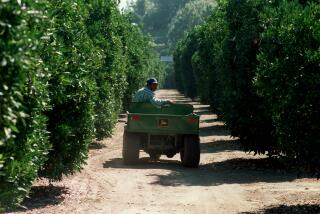Scripps Mired in Feud Over the Law of the Land
- Share via
WEST PALM BEACH, Fla. — Someday, the remote tract of Florida scrubland where ospreys soar on warm midday thermals may be where medical history is made. For the moment, though, the sole signs of human endeavor are the rumbling dump trucks that cart away creamy sand, 20 tons at a time, from a quarry on the site.
A little more than a year ago, Gov. Jeb Bush, the president’s brother, announced what he termed a coup as big for Florida as Walt Disney Co.’s arrival in Orlando: Another internationally known California institution, Scripps Research Institute of La Jolla would build a major biomedical research facility on the eastern fringe of the Everglades.
It could mean tens of thousands of new jobs, an economic windfall in the billions of dollars, and an opportunity for Florida to get a piece of the fast-growing biotech sector. Since that optimism-filled announcement, though, a storm of objections from environmentalists and advocates of regulated development has brought plans for Scripps Florida to a halt, at least for the foreseeable future.
Bevin Beaudet, the Palm Beach County official in charge of the Scripps project, points to a box filled with rolled-up blueprints on the floor of his office. The designs for the Scripps center’s first three buildings were ready, said Beaudet, but he admitted he didn’t know when, or even if, work would begin.
“We’re excited by the project. We’d like to start building it,” Beaudet said. “We have potential tenants out there. Obviously, this has been frustrating.”
What has galvanized opposition to the Scripps center and halted work for the time being is not the project itself, but the spot chosen for it: a former orange grove known as Mecca Farms. The site is 18 miles west of the city of West Palm Beach, adjacent to publicly owned conservation areas and near the scenic Loxahatchee River.
Building Scripps Florida on this 1,920-acre site -- where white-feathered egrets now stalk insects flushed by the passing dump trucks -- runs counter to mandated rural, low-density land use, environmentalists say. It could trigger a boom that would further extend South Florida’s sprawl, they say.
For some environmentalists, the vision of building Scripps Florida and related roads, businesses, housing, schools, clinics, and shopping and recreational areas in the inland countryside constitutes the greatest flouting to date of the 1985 law that laid down the rules regulating development and land use in Florida.
“They are basically putting a development the size of West Palm Beach out there,” said Janet Bowman, legal director for 1000 Friends of Florida, a group that advocates controlled growth. “Basically, they are ignoring years of growth management policy. If this is not sprawl, then I don’t know what is.”
On Monday, 1000 Friends of Florida, the Florida Wildlife Federation and others filed two suits in state circuit court in West Palm Beach to try to bar Scripps’ use of the Mecca Farms site, in large part because the development would violate the county’s own comprehensive plan.
Manley Fuller, president of the Florida Wildlife Federation, said his organization, like 1000 Friends, backed the idea for creating a biotech center in Palm Beach County -- as long as it was situated somewhere else.
Otherwise, Fuller said, “the infrastructure for Scripps will be the sharp point of the lance, opening that part of the county to development.”
At the moment, the biotech center’s designated home is accessible only by dirt road, and lacks water, sewer service and other conveniences. Under the deal hammered out with Scripps under the governor’s guidance, those improvements are supposed to be provided at taxpayers’ expense, as are the 320,000 square feet of buildings Scripps plans for its offices and laboratories. The county’s contribution to the project would be about $600 million; Florida’s Legislature has approved $310 million in state funds.
Keith McKeown, vice president for communications and public relations at Scripps in La Jolla, declined to comment on the legal challenges filed over Mecca Farms, but said his employer remained “guardedly optimistic” the project would be allowed to proceed.
“It’s still our expectation that we will be able to pull all the permits and begin construction before too long,” McKeown said. “There are still a number of hurdles we have to get over, but we want to do this.”
If or when the complex gets built, it is supposed to focus on biomedical science, drug discovery and technology development, and employ the most advanced techniques to enable the testing of innovative and promising drug compounds in large quantities, McKeown said.
“We’re hoping we’ll make major discoveries related to human disease,” the spokesman said. Scripps Florida is also meant to be “a scientific and an economic engine” that powers growth and helps Florida capitalize on what some experts believe could be a biotech boom, he said.
Harry W. Orf of Massachusetts General Hospital and Harvard Medical School has already been named vice president for scientific operations for Scripps Florida. Charles Weissmann, former senior research scientist in the department of neurodegenerative diseases at University College London, has been appointed head of the center’s department of infectology.
For Palm Beach County, the coming of Scripps is seen as bringing multiple benefits, which could include creating high-paying professional and technical jobs, diversifying the economy, and raising educational standards in the schools, said County Commissioner Karen T. Marcus.
Upfront contributions by taxpayers may seem hefty, she acknowledged, but the county should be able to recoup its expenditures by selling public lands whose values have increased due to the project.
However, Marcus said she had recently been informed by county attorneys that litigation over the Mecca Farms site could drag on for four years. If the matter appears bogged down in the courts, Marcus said, she hopes Scripps will reconsider and choose another location.
“We do see that dream, we do see them curing Alzheimer’s or something else in our county,” Marcus said. “But we want to get it done now.”
Ground for Scripps Florida was set to be broken Jan. 3, but that has been delayed because of an earlier challenge to a permit issued by the South Florida Water Management District.
That action has prevented the county from building paved roads to the site and performing other preparatory work. On Nov. 16, the state Department of Community Affairs ruled that land-use changes approved by the county for Mecca Farms violated state law, but it recommended a way to quickly bring the changes into compliance.
An agreement signed with Scripps specified they should be in their buildings by late 2006. “That’s a pretty tall order no matter what you’re doing,” said Beaudet. Last summer, as complaints over plans for Mecca Farms grew more vocal, officials from the county looked for other potential sites, Beaudet noted. The largest alternative, he said, was 800 acres, not big enough for all that was planned.
“The sad thing is, these properties could get developed in five years anyway,” Beaudet said. It would be much better, he said, to have a world-class scientific institution, and all the benefits it would carry, at Mecca Farms rather than another golf course.
“From a siting standpoint, it would have been hard to consciously choose a worse spot,” countered Marcy LaHart, an attorney for the Florida Wildlife Federation. “There were other sites available where the permitting would have been much less cumbersome. Based on this poor land-use decision, the entire Scripps project is in jeopardy.”
More to Read
Sign up for Essential California
The most important California stories and recommendations in your inbox every morning.
You may occasionally receive promotional content from the Los Angeles Times.













